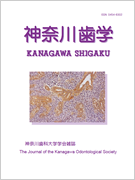- HOME
- > 一般の方
- > バックナンバー:神奈川歯学
- > 12巻4号
- > アブストラクト
アブストラクト(12巻4号:神奈川歯学)

Japanese
| Title : | 性格ことに気質と歯科疾患 |
|---|---|
| Subtitle : | 原著 |
| Authors : | 松沢昭生, 飯塚喜一 |
| Authors(kana) : | |
| Organization : | 神奈川歯科大学口腔衛生学教室 |
| Journal : | 神奈川歯学 |
| Volume : | 12 |
| Number : | 4 |
| Page : | 223-234 |
| Year/Month : | 1978 / 3 |
| Article : | 原著 |
| Publisher : | 神奈川歯科大学学会 |
| Abstract : | 「はじめに」歯周疾患における全身的因子および局所的因子の影響に関する研究は非常に多く, また広範囲に行われてきている. 局所刺激因子の重要性については十分に考察され, 歯周疾患の主要な原因として位置づけられてきているが, 全身的因子に関しての研究は多数あるものの, それらの歯周疾患発病におよぼす程度や重要性については, かならずしも十分には判明していない. Selyeが疾病の原因としてのストレス学説も発表して以来, 多くの研究者により支持されてきた. Henry & Ebelingによると, 興奮したヒトの血中CaおよびPレベルは低下しているという. また, Neilsonは情緒的に混乱したヒトでは糖耐容能が低下し, よく糖尿になることを見出している. さらに, 精神的ストレスを受けているヒトでは好エオジン白血球数が低下するという所見もある. 精神的ストレスと歯科疾患との関係についてはそれほど多くの研究があるわけではない. |
| Practice : | 歯科学 |
| Keywords : |
English
| Title : | CHARACTER - ESPECIALLY TEMPERAMENT - AND ORAL DISEASES |
|---|---|
| Subtitle : | |
| Authors : | Akio Matsuzawa, Y.Iizuka |
| Authors(kana) : | |
| Organization : | Department of Dental Health, Kanagawa Dental College |
| Journal : | Kanagawa Shigaku |
| Volume : | 12 |
| Number : | 4 |
| Page : | 223-234 |
| Year/Month : | 1978 / 3 |
| Article : | Original article |
| Publisher : | Kanagawa Odontological Society |
| Abstract : | [Abstract]: 298 male adults in an industry (average years : 28.76 +- 2.73) and 303 male students in a dental school were given the SEIKEN-type Personality Inventory (SPI). This paper-and-pencil test has been found to correlate favorably with clinical evaluation of type of temperament. All samples were given dental examinations consisting of DMF count, DI or DI-S score (Vermillion's), PMA score and PI score (Russell's). Besides, all studsnts were given a salivary flow test stimulated by paraffin chewing, and all adults in an industry were given a paper-and-pencil test with common habits and tastes or fancies. Considering of present results, following conclusions may be introduced : ...... 1. In this study population, there were apparent tendencies of lower scores of DMF count, DI or DI-S score, PMA score and PI score - Especially of DMF count and PI score - in "Epileptic Temperament" (E-type). 2. A significantly higher value of salivary flow rate (paraffin-stimulated) was found in E-type. 3. Most frequent toothbrushing habit and lesser between-meal habit were seen in E-type. 4. Lesser smoking habit and lesser examinee having winefondness were in E-type. In "Schizothymic Temperament" (S-type), a similar finding was seen. 5. From the results of oral conditions obtained by reexamination after one year, it may be considered that - the "Motivatability" is highest in E-type, higer in S-type, and lowest in "Zyklothymic (Cyclothymic) Temperament" (Z-type), respectively. |
| Practice : | Dentistry |
| Keywords : |
